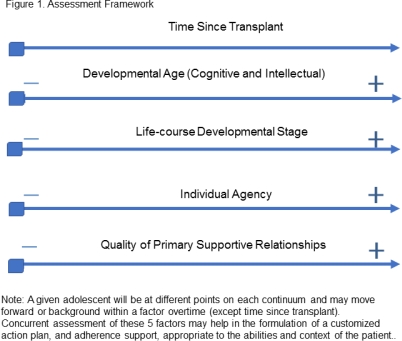A Research-Informed Framework for a Medication Adherence Intervention to Support Transition of Adolescent Kidney Recipients to Independent Medication-Taking
1University of Pittsburgh, Pittsburgh, PA
2MUHC, McGill, Montreal, QC, Canada.
Meeting: 2018 American Transplant Congress
Abstract number: B240
Keywords: Kidney transplantation, Pediatric
Session Information
Session Name: Poster Session B: Kidney: Pediatrics
Session Type: Poster Session
Date: Sunday, June 3, 2018
Session Time: 6:00pm-7:00pm
 Presentation Time: 6:00pm-7:00pm
Presentation Time: 6:00pm-7:00pm
Location: Hall 4EF
Purpose: Understand the needs and preferences of adolescent/young adult kidney recipients (12-24y), parents, and healthcare professionals (HCP), to inform adaptation of an efficacious adherence-promoting intervention (the TAKE-IT intervention) for use in real-world practice.
Methods: Separate focus groups (FG) of adolescents (12-14, 15-17, 18-24y), parents (12-17y), HCPs were conducted at 7 transplant centers. Transcribed FG audio-recordings were analyzed to explore perspectives of each stakeholder group and factors they believed would optimize medication adherence.
Results: Across 16 FG, 32 adolescents (n=8 12-14y; n=11 15-17y; n=13 18-24y), 15 parents, 46 HCPs participated. The framework was generated from a synthesis of the qualitative data from the FG and informed by relevant literature. It includes 5 inter-related factors that influence the ways in which medication adherence is approached by stakeholders. Contextually relevant factors included: 1) time since transplant, 2) developmental age (cognitive and intellectual), and 3) stage of life-course development; interpersonal/social factors included: 4) individual agency and 5) quality of primary supportive relationships. Each of the 5 factors can be assessed on a continuum .These factors will inform the development of personalized action plans to address medication adherence barriers, explicitly acknowledging the young person's strengths and limitations, and supporting the transition to independent medication-taking.
Conclusions: The identified factors that influence medication adherence and readiness for greater independence were interrelated, and should therefore be assessed together. Assessment of these 5 factors may help in the formulation of a customized action plan, and adherence support, appropriate to the abilities and context of the patient. The framework is one element of a proposed intervention to support adolescents' medication-taking and readiness for greater independence as they become young adults. TAKE-IT TOO investigators acknowledged. TAKE-IT investigators. R01DK110737 
CITATION INFORMATION: Irizarry T., DeVito Dabbs A., Dew M., Foster B. A Research-Informed Framework for a Medication Adherence Intervention to Support Transition of Adolescent Kidney Recipients to Independent Medication-Taking Am J Transplant. 2017;17 (suppl 3).
To cite this abstract in AMA style:
Irizarry T, Dabbs ADeVito, Dew M, Foster B. A Research-Informed Framework for a Medication Adherence Intervention to Support Transition of Adolescent Kidney Recipients to Independent Medication-Taking [abstract]. https://atcmeetingabstracts.com/abstract/a-research-informed-framework-for-a-medication-adherence-intervention-to-support-transition-of-adolescent-kidney-recipients-to-independent-medication-taking/. Accessed July 12, 2025.« Back to 2018 American Transplant Congress
